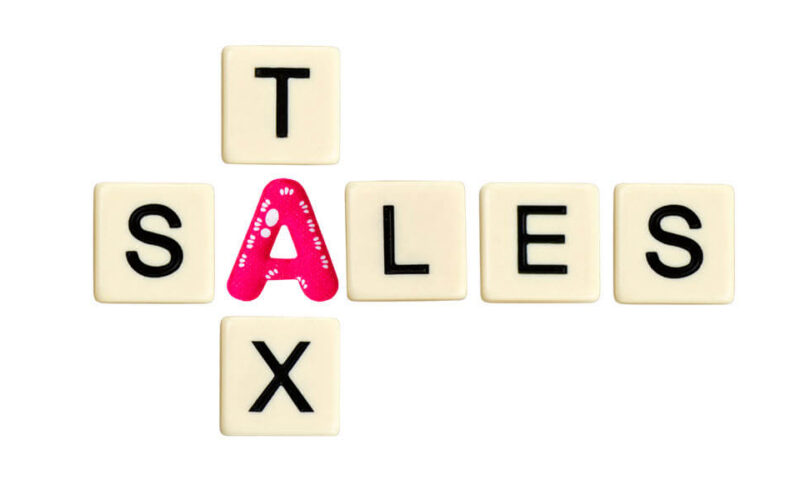Sales Tax tracking could (and probably will) get way more complicated for your handmade business. On Thursday June 21, 2018 the Supreme Court passed a law in which every state who has not already done so may now pass laws requiring all online retailers to collect sales tax and remit it to the state where the customer lives.
Sound confusing? Let me provide you with a really simple example:
My business is located in Vermont, I make a sale of something to a customer in Ohio. Currently, I do not have to charge the Ohio customer any Sales Tax. Under the new law, I can be required to charge the Ohio customer the Ohio Sales Tax rate, collect it from that customer AND remit that Sales Tax to the State of Ohio.
This is seen as a HUGE win for state and local governments as well as in-state retailers.

State and local governments have felt that they have “unfairly” been deprived of sales tax revenue due to the popularity of eCommerce companies selling on-line to customers who would otherwise have paid sales tax to in-state retailers.
Some states are already estimating that they could see a 20, 25, or even 50 percent increase in sales tax revenue or anywhere from $8 to $23 BILLION dollars a year – according to various articles that I’ve read in the last week.
In-state retailers have felt that they were being deprived of sales opportunities caused by the ability of out of state retailers being able to offer the same merchandise to customers without having to charge those customers sales tax.
From what I’ve read, many small brick and mortar store owners see this as a “saving grace” of sorts because they feel that as internet sales expand more local businesses close.
But that’s not all there is to it!
While this is seen as a victory – of sorts – for the government and local retailers, the Supreme Courts decision still isn’t viewed as being a level playing ground when it comes to the taxation of sales.
There are some State officials and trade organizations who are blaming Congress for failing to implement a nationwide system for fair sales tax rules for online sales.
Many states have already enacted “economic nexus” which establish thresholds in which on-line retailers had to either collect and remit taxes to the state or provide information about their customers and sales in order for state tax authorities to look for tax payers with obligations.
It’s likely now that the states who haven’t already enacted economic nexus laws will be rushing to put bills through their legislature.
It’s also possible that Congress will now step up to the plate and implement something into three different bills that they are currently working on.
What does this mean for your handmade business?
Well no one knows for sure at this point – we all just have to sort of wait and see. From my understanding, while making this decision the Supreme Court Justices highlighted and discussed more than 10,000 tax jurisdictions and the complexity of state tax laws that will impact almost all on-line retailers. Here are two that were mentioned in one article:
- Knitters in New Jersey pay sales tax on yarn purchased for art projects, but not yarn for sweaters
- In Texas, plain deodorant is taxed at 6.25% but there is no tax on deodorant with antiperspirant.
One thing is for sure, It’s complex things like this that is going to make manual sales tax tracking, even following the tips I offered last month in Sales Tax tracking tips for your handmade business, almost impossible for the small one person micro businesses like ours.
Josh Silverman, Etsy’s CEO issued a statement on Etsy’s blog (https://blog.etsy.com/news/2018/etsy-responds-to-u-s-supreme-court-decision/ ), indicating that “While today’s decision is not the one for which we advocated, the Supreme Court did acknowledge the important difference between big internet retailers and the creative entrepreneurs on our platform”. Etsy is concerned about what it sees as “significant complexities in the thousands of state and local sales tax laws”. Additionally, Silverman added – We believe there is now a call to action or Congress to create a simple, fair federal solution for micro-businesses”.
According to the article on Etsy, apparently one of the Supreme Court judges – Chief Justice John Roberts – stated “The burden will fall disproportionately on small business. One vitalizing effect of the internet has been connecting small, even ‘micro’ businesses to potential buyers across the nation. People starting a business selling their embroidered pillowcases or carved decoys can offer their wares throughout the country – but probably not if they have to figure out the tax due on every sale.”
So, what exactly does this mean for small handmade business owners or the ‘micro’ businesses that Chief Justice Roberts mentioned?
Honestly I don’t think anyone has any answers yet or knows for certain. According to an article I read from Forbes dated 6/26/18 it was predicted that individual state lawmakers would be making changes within the next year or 18 months. I will be researching this issue from this point forward and keep you updated.



[…] Sales Tax, the Supreme Court Decision & your handmade business […]
[…] Back in June of 2018, the Supreme Court passed a law allowing states (who hadn’t previously done so), to pass laws that required ALL online sellers to collect Sales Tax and remit it to the state where the customer lives. (I wrote a blog post on it back then – Sales Tax, the Supreme Court Decision & your handmade business) […]